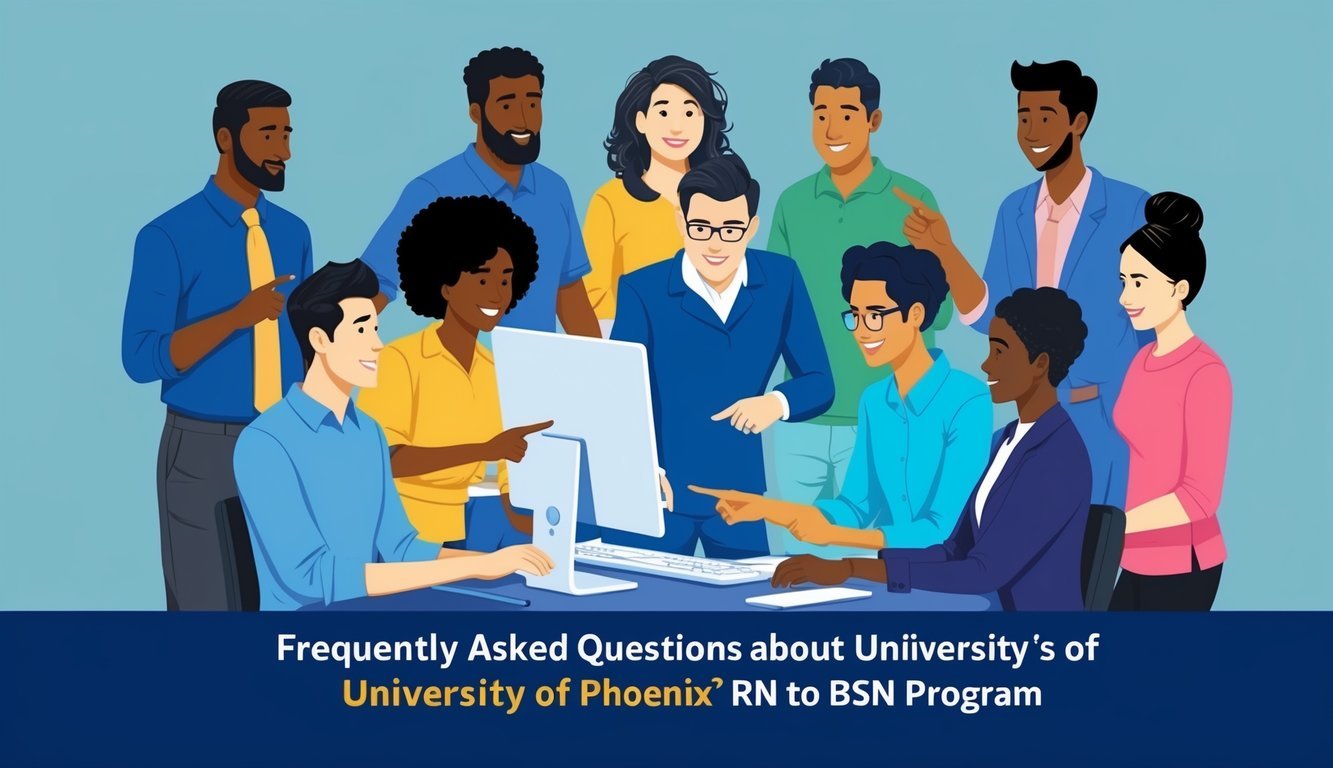Earning a Bachelor of Science in Nursing (BSN) can greatly enhance your career opportunities and earning potential in the healthcare field. The University of Phoenix offers a flexible RN to BSN program that allows you to build on your associate degree in nursing (ADN) and complete your bachelor’s degree efficiently.
Whether you’re currently working or looking to advance your education, this program is designed to accommodate your busy schedule.
With a focus on relevant skills and knowledge, the curriculum covers essential nursing components while also providing options for specializations.
You’ll find that the University of Phoenix not only supports your educational journey with various financial aid options but also prepares you for a rewarding career in nursing after graduation.
Explore how the University of Phoenix can help you transition from an RN to a BSN, and discover the avenues this degree can open for your future.
Key Takeaways
- The University of Phoenix RN to BSN program is designed for working nurses.
- Flexible tuition and financial aid options are available to support your education.
- Completing a BSN enhances your career opportunities in nursing.
Overview of University of Phoenix RN to BSN Program
The RN to BSN program at the University of Phoenix is designed for registered nurses looking to advance their education.
This program combines a flexible structure with competency-based learning to help you gain a Bachelor of Science in Nursing while enhancing your professional skills.
Program Structure
The RN to BSN program allows you to transfer up to 87 credits from your Associate Degree in Nursing (ADN).
You can complete this degree in as little as 12 months if you use the competency-based track.
Key Points:
- Program Length: Typically, it takes about 1 year of full-time study.
- Transfer Credits: Up to 87 credits can be transferred, saving you time and money.
- General Education: You will complete general education courses online, making it easier to fit into your schedule.
This structure supports diverse learning needs, giving you the chance to manage your studies alongside personal and work commitments.
Competency-Based Learning
In the competency-based RN to BSN track, you have control over your learning pace.
This means you can progress as you master skills and knowledge rather than following a fixed schedule.
Features Include:
- Self-paced Learning: Take charge of your education by moving forward when you’re ready.
- Faculty Support: You have access to faculty who provide guidance to help you succeed.
- Skill Focus: Emphasis is placed on practical skills, preparing you for real-world nursing challenges.
This format is ideal for busy professionals who want to advance their careers without traditional classroom constraints.
For more information, you can explore their official nursing programs page.
Admission Requirements and Application Process

Understanding the admission process will help you navigate the steps needed to enroll in the RN to BSN program at the University of Phoenix.
Below are the key criteria and procedures to ensure a smooth application.
Eligibility Criteria
To be eligible for the RN to BSN program, you must hold a valid, unencumbered Registered Nurse (RN) license.
You should have an Associate Degree in Nursing (ADN) or a diploma in nursing from an accredited institution.
Your ADN should ideally include the foundational courses in nursing.
This program is designed for licensed RNs looking to advance their education and career opportunities.
If you meet these criteria, you’re set to begin the application process.
Transfer Credits
The University of Phoenix allows you to maximize your previous education by transferring up to 87 credits into the RN to BSN program.
This can include your ADN coursework and other relevant classes.
Here’s a quick reference on how transfer credits work:
| Type of Credit | Maximum Credits Allowed |
|---|---|
| Associate Degree Credits | Up to 87 |
| General Elective Credits | Varies based on evaluation |
Transferring these credits can save you both time and money.
It’s essential to have your transcripts evaluated early in the process to determine which credits can be applied.
Application Submission
To begin your application, you will need to fill out the form available on the University of Phoenix website.
Be prepared to provide your RN license number, transcripts from previous education, and any other required documentation.
Make sure to gather the necessary materials before starting the application.
This includes:
- Official transcripts from prior institutions
- Proof of RN licensure
- Personal identification
After submitting your application, you might undergo an interview or an assessment.
Always check your email for updates regarding your application status.
By following these steps carefully, you can facilitate a smoother admission experience.
Tuition, Financial Aid, and Scholarships
When considering the RN to BSN program at the University of Phoenix, understanding the costs, financial aid options, and available scholarships is essential.
You will find various ways to fund your education, making it more accessible to advance your nursing career.
Tuition Costs
The tuition for the RN to BSN program at the University of Phoenix is designed to be flexible to accommodate your needs.
As of the 2024/2025 academic year, the estimated cost per credit hour is $398.
For a typical program requiring around 120 credits, your total tuition may amount to approximately $47,760.
| Tuition Breakdown | Cost per Credit | Total Estimated Cost |
|---|---|---|
| RN to BSN Program | $398 | $47,760 |
Make sure to check for any additional fees or costs related to books and course materials.
Financial Aid Options
To assist in managing tuition costs, various financial aid options are available.
You can apply for federal and state grants, which do not require repayment.
Additionally, the University of Phoenix provides loans that help cover tuition and other expenses.
To explore options, complete the Free Application for Federal Student Aid (FAFSA).
This application considers your financial circumstances and helps determine your eligibility for different programs.
Scholarship Opportunities
Scholarships are an excellent way to reduce your education costs without the need for repayment.
At the University of Phoenix, various scholarships are offered to eligible students.
For instance, you can find scholarships based on your academic performance, field of study, or community service.
To learn about specific scholarships and how to apply, visit the Scholarship Opportunities at the University of Phoenix page.
Tuition Discount Programs
The University of Phoenix offers several tuition discount programs.
These programs can significantly reduce your overall tuition costs.
For example, if you are a member of the military or a veteran, you may qualify for the Military Tuition Grant, which lowers your tuition rates.
Additionally, tuition discounts may be available for employees of partner companies.
To find out if you qualify, check with the admissions office or visit the website for details on available discount programs.
Curriculum and Specializations

The RN to BSN program at the University of Phoenix offers a comprehensive curriculum that equips you with essential nursing skills and knowledge.
The program includes core nursing courses and various specializations that cater to diverse interests in the nursing field.
Core Nursing Courses
In the core nursing courses, you will study essential topics that build your competency as a registered nurse.
Courses cover subjects like evidence-based practice, advanced patient care, and health assessment.
These courses help you understand critical concepts such as:
- Healthcare Systems: Learn how different systems work within the healthcare environment.
- Patient-Centered Care: Focus on techniques to enhance patient interactions and improve outcomes.
- Research Methods: Gain skills in analyzing research to support your nursing practice.
You will also engage in assignments that challenge you to apply what you have learned in real-world situations.
Specialty Tracks
The University of Phoenix offers specialty tracks that allow you to tailor your education to specific areas of interest.
These tracks include focused studies in fields like nursing leadership and public health nursing.
Each track consists of targeted courses, enabling you to deepen your expertise.
For example, nursing leadership courses might include:
- Leadership Theory: Understanding different leadership styles applicable in nursing.
- Management Skills: Developing skills to lead teams and improve healthcare delivery.
Specialty tracks prepare you for advanced roles and responsibilities in nursing.
Public Health Nursing
The public health nursing coursework focuses on community health, preventive care, and health promotion strategies.
You will learn how to assess community needs and develop programs aimed at improving public health outcomes.
Key topics include:
- Epidemiology: Understand disease distribution and determinants of health in populations.
- Community Assessment: Techniques for evaluating health needs at the community level.
- Health Education: Skills to educate communities about health issues and promote healthy behaviors.
This focus on public health is crucial in addressing health disparities and improving quality of life within communities.
Nursing Leadership
Courses in nursing leadership prepare you to take on supervisory roles in various settings.
You will learn not just about leading teams but also about strategic planning and resource management.
Essential areas of study include:
- Conflict Resolution: Techniques to manage and resolve conflicts in nursing teams.
- Quality Improvement: Understanding how to implement initiatives that enhance healthcare delivery.
- Ethical Leadership: Exploring the ethical challenges faced by nurse leaders.
Through these courses, you will be equipped to lead effectively and advocate for nursing practices that improve patient care.
Career Pathways after BSN

Earning a Bachelor of Science in Nursing (BSN) opens various career pathways for you as a nurse.
These options enhance your professional skills and expand your opportunities.
You can advance in your nursing career, prepare for master’s degrees, or pursue licensure and specializations.
Advancing in a Nursing Career
With a BSN, you have a clear advantage in the nursing field.
Many hospitals and healthcare organizations prefer or require a BSN for leadership roles.
This degree can qualify you for positions like nurse manager, clinical nurse leader, or nurse educator.
You will also be better prepared for specialty certifications.
Some common specialties for BSN-prepared nurses include:
- Pediatric Nursing
- Emergency Room Nursing
- Critical Care Nursing
- Public Health Nursing
These roles often come with higher salaries and increased responsibilities.
Preparation for Master’s Degrees
A BSN is the foundation for pursuing a Master’s Degree in Nursing (MSN).
With an MSN, you can specialize further in areas like Nurse Practitioner, Nurse Anesthesia, or Nurse Midwifery.
Each of these paths offers unique opportunities.
For instance:
- Nurse Practitioners can diagnose and treat patients, while often working independently.
- Nurse Anesthetists administer anesthesia and are crucial in surgical settings.
- Nurse Midwives provide prenatal, delivery, and postnatal care.
These advanced roles typically require you to pass specific licensure exams and may lead to significantly higher earnings.
Nursing Licensure and Examinations
To practice as a licensed registered nurse (RN), you must pass the NCLEX-RN examination.
Completing your BSN prepares you well for this test.
After obtaining your license, you may choose to pursue additional certifications or specialties.
Many employers support continuing education and encourage nurses to further their skills.
For instance, participating in programs like BSN in 10 can help you stay competitive and compliant with changing regulations in nursing practice.
This pathway enhances your career and ensures you meet the evolving needs in healthcare.
Frequently Asked Questions

You may have questions about the RN to BSN program at the University of Phoenix.
This section covers the admission requirements, tuition costs, program structure, student feedback, and program duration.
What are the admission requirements for the RN to BSN program at the University of Phoenix?
To enroll in the RN to BSN program, you need to have a valid RN license.
Additionally, you should hold an Associate Degree in Nursing (ADN).
An application, along with transcripts from previous institutions, is typically required.
How much is the tuition for the RN to BSN program at the University of Phoenix?
Tuition rates can vary, but typically, the cost is around $398 per credit hour.
It’s important to check with the university for the most accurate and current pricing.
Additionally, financial aid options may be available to help manage costs.
Can the RN to BSN program at the University of Phoenix be completed entirely online?
Yes, the RN to BSN program is designed to be completed entirely online.
This flexibility allows you to balance your studies with your professional and personal life, making it convenient for working nurses.
What are some student reviews of the RN to BSN program at the University of Phoenix?
Many students appreciate the flexibility and the support offered by faculty.
Reviews often highlight the convenience of online classes.
However, experiences may vary, and it’s helpful to read multiple reviews to get a well-rounded perspective.
Are credits earned from the University of Phoenix’s RN to BSN program widely recognized?
Credits from the University of Phoenix are generally accepted by many institutions, but it can depend on the receiving school’s policies.
It’s advisable to check with any future schools regarding credit transfer before enrolling.
What is the duration of the RN to BSN program at the University of Phoenix, and is there an accelerated option?
The RN to BSN program usually takes about 14 months to complete if you’re transferring in 87 credits.
An accelerated option is also available.
This option allows you to finish in as little as 12 months, especially through competency-based learning.

